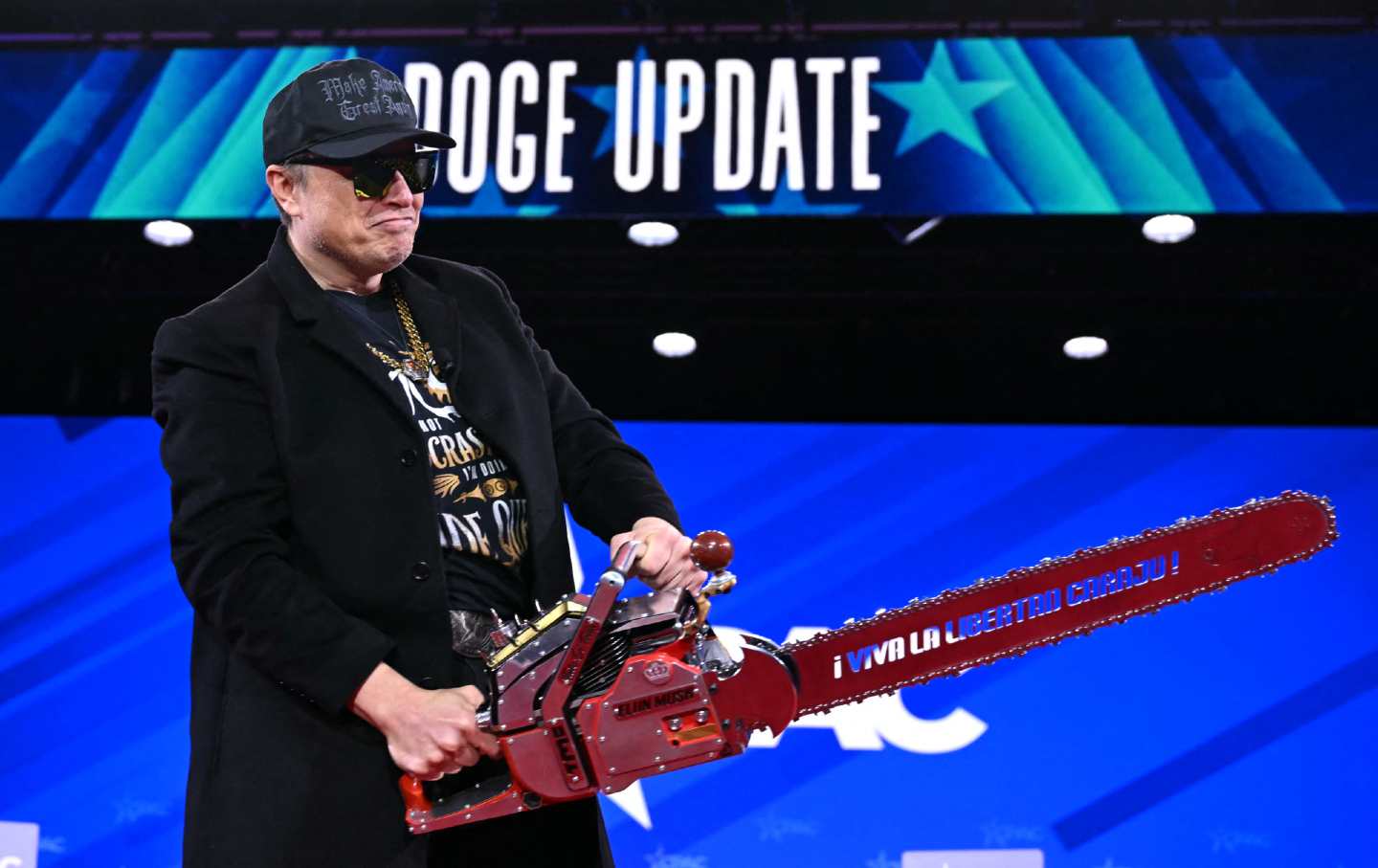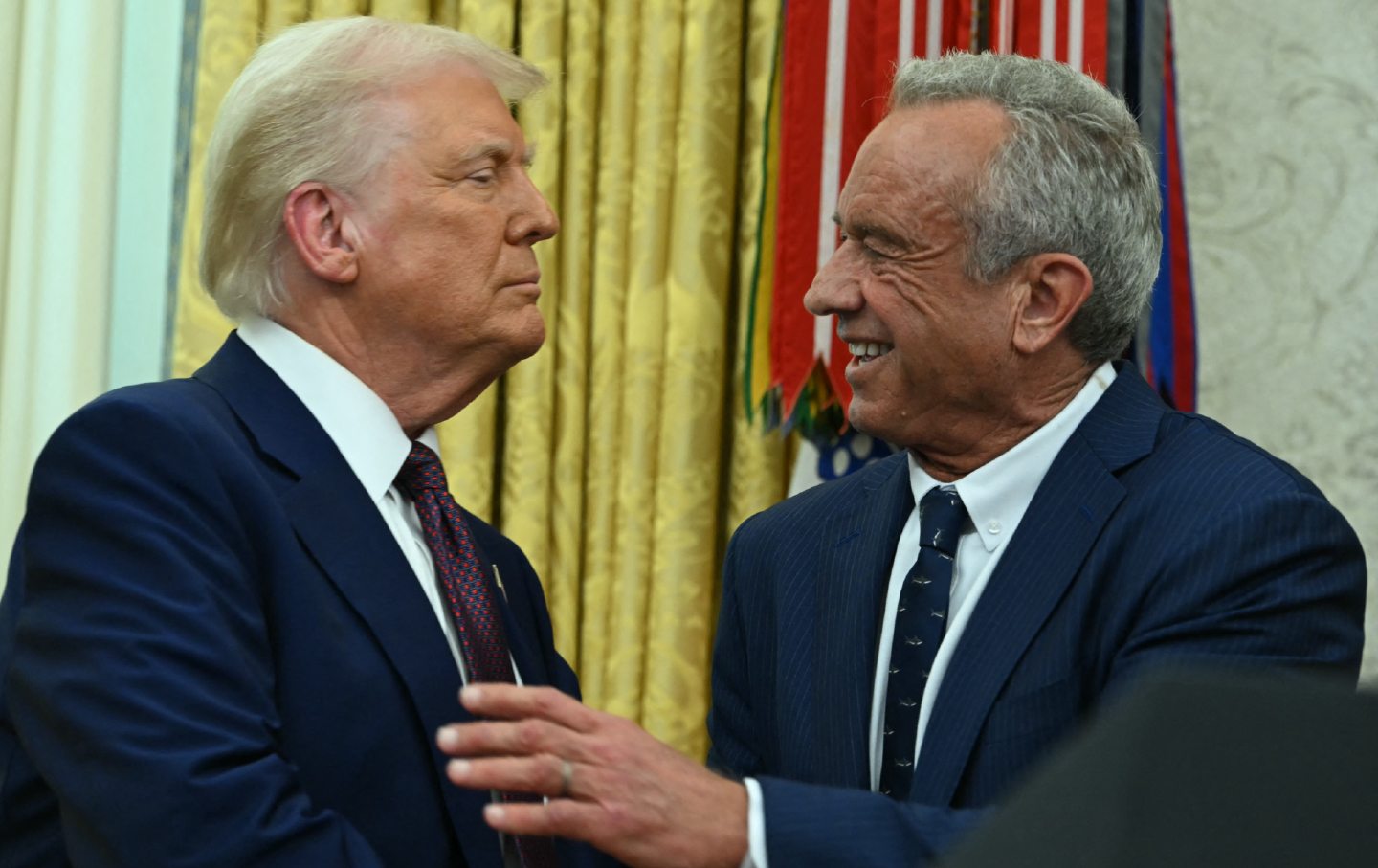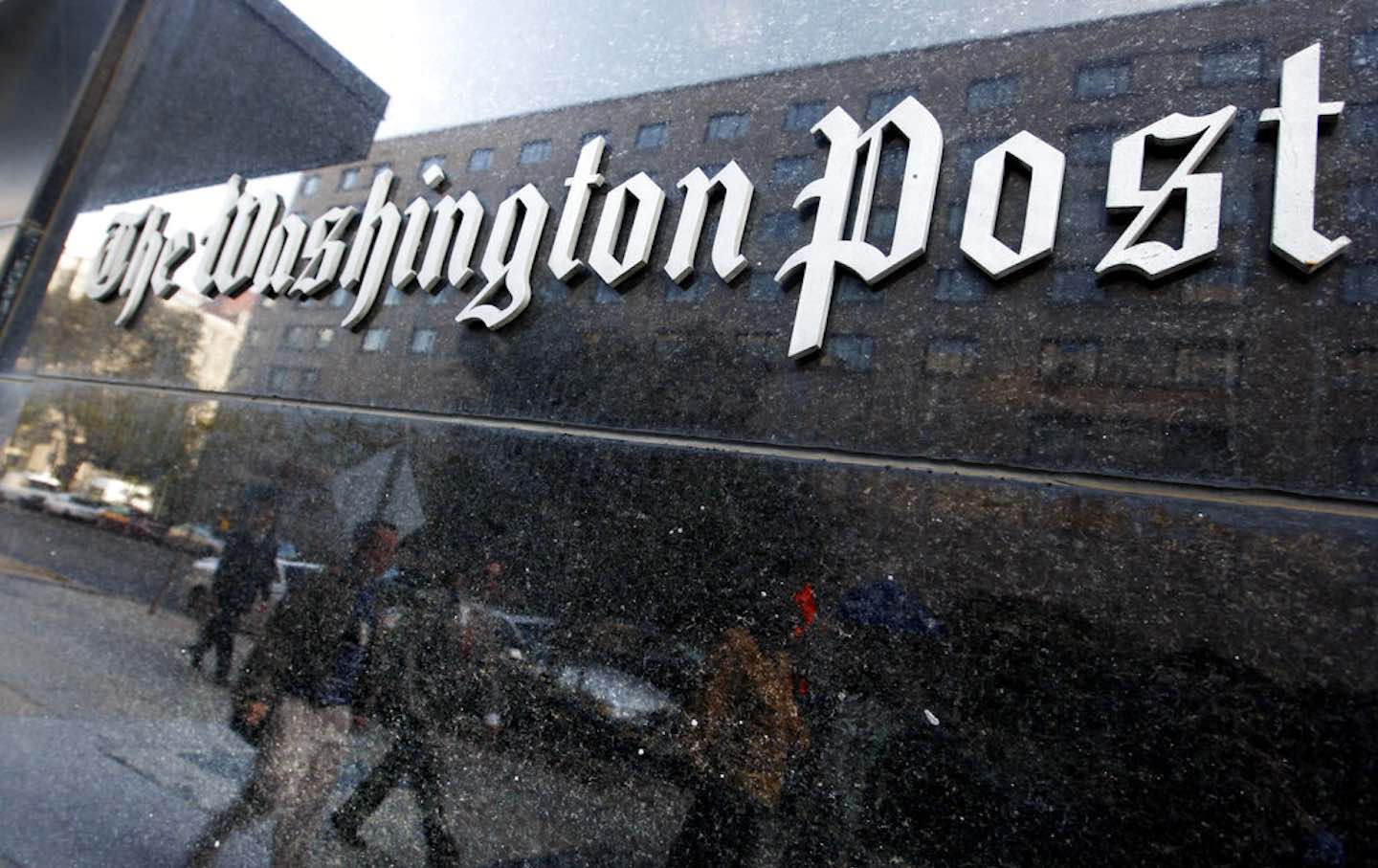Media Elites Are the Last People to Ask About the Future of Journalism
And New York magazine’s latest cover package does just that.

New York magazine’s October 21, 2024 issue.
(The Nation)It’s an admittedly minor wrinkle in the mass derangement building up to the 2024 election, but future historians will be at a loss to explain why New York magazine chose this moment to roll out a cover package that ballyhoos the deep thoughts of media industry executives. The quote-stravaganza, assembled by the magazine’s apparently indefatigable processor of PR copy, media columnist Charlotte Klein, is a long and numbing cri de coeur from the C-suites—the very bosses who have irredeemably fouled up the underlying business model for mainstream journalism are tasked here with divining the industry’s path forward. The whole exercise is a bit like canvassing the designer of the Hindenburg on the future of air travel.
Then there’s the question of timing: The lords of the press are holding forth on how their prestige outlets will survive at the precise moment they’re fucking up coverage of the 2024 election on an epic scale. Any intelligible understanding of the press’s role has to start with the mandate the country’s founders formalized in the First Amendment—the pivotal need to cultivate and sustain an informed citizenry. Not surprisingly, neither Klein nor her battery of 57 pop-up news managers have word one to say about this function of the press. That’s likely because a significant number of them are deeply enmeshed in normalizing the demented, fascistic candidacy of Donald Trump, and generally treating a critical election cycle as a glorified reality-TV spectacle. Indeed, in an awkward karmic coincidence, New York unleashed its future-of-the-media package just as it officially severed ties with its star politics reporter, Olivia Nuzzi, for carrying out digital intimacies with Robert F. Kennedy, the antivax conspiracy impresario now shilling for Trump. (Nuzzi’s prior drinking bouts with neo-Nazi Richard Spencer or her fangirl worship of Ann Coulter weren’t dealbreakers for New York’s top brass, but that’s a sermon for another occasion.)
In lieu of any topic of civic interest, the moguls’ discussion is stalwartly platform-and-revenue addled—the same dipshit calculation that led this same professional caste to hand their basic business model over to Facebook circa 2008. That move ensnared them in a shameful race to the bottom when the monarchs of Silicon Valley told them to form a herd and pivot to video, with no empirical basis whatsoever. It turned out that no news readers wanted more video content; advertisers alone did—the whole farcical escapade even harmed Facebook’s own business model.
But who ever said the gatekeepers of information should learn anything from their own past? Klein and her squad of editorial assistants instead breezily canvass them on executive preoccupations ranging from the gnat-strainingly trivial (“Who will be the Walter Cronkite of YouTube?”) to the abjectly subliterate (“What’s the point of print?”). As a result, the level of discourse is less a considered view of how journalism can lift the country out of its present authoritarian nightmare than an afternoon spent watching a cat chasing a laser pointer.
Does inept Trump-enabling CEO Jeff Zucker, who famously aired acres of unfiltered Trump rally footage during his tour atop CNN, deliver meaningless platitudes? You bet! Here’s the maestro’s sage read on the news business’s future: It’s “going to look very different over the next five years than it did for the previous fifty.” Does Nick Thompson, CEO of The Atlantic, aka the worst magazine in America, have a potted history of journalism’s failure to adapt to disruptive ad technologies? And how! “We were so excited about infinite free distribution we didn’t see that the whole premise of the business model that supported this thing was getting undercut relatively quickly,” Thompson declares. “We didn’t respond appropriately and didn’t build the right business models quickly enough. Then by the time we did, most of us had our lunch eaten.”
Actually, as the pivot-to-videa fiasco showed, no one had any firm grip on how to adapt to anything; everyone in the C-suites was just blindly mimicking one another in the hopes that the gods of connectivity and aggregation might one day deign to smile on them. The sad fact of the matter is that none of these empty suits had the first idea where to find their lunches in the first place.
It goes on like this, interminably. Bryan Goldberg, the CEO of Bustle Group, a digital concern that has declared open war on quality journalism, offers this ludicrously self-ennobling read on Google’s search antics: “It’s one thing to place less emphasis or weight on authority. It’s another to actively harm those publishing houses that have reputations and authority.” This is rich from a company founded on the inert clickbait forum Bleacher Report, and from a boss who pays sweated wages to his content-farm employees.
The executive chorus sings hosannas over The New York Times—which is now perpetrating some of the most disgraceful political coverage in recent memory while toeing Netanyahu’s line on the genocide in Gaza—for its market savvy in acquiring Wordle, and a host of regular return readers in the bargain. “As the rest of the industry scrambles for scraps,” Klein burbles in her summation of elite opinion, “the Times has become the Amazon of legacy media—an everything store for blue-state America’s information needs (and more).”
Of course, the unrivaled market dominance of a sole player is what’s known as a monopoly—an arrangement that’s toxic for a sanely ordered political economy, and disastrous for a formal democracy. But why be detained by such dull wonkery? Tee up another Jeff Zucker quote! “They figured it out first—how to make a killing off recipes and games that could sustain the rest of their journalism,” the brains behind The Apprentice enthuses.
The mood of unearned media self-love runs throughout the feature, leaving readers trapped in a cocktail party they wouldn’t dream of crashing. Matt Yglesias, the man who’s converted brain-dead centrism into a $1.4 million Substack payday, enthuses thusly of fellow media hustlers Ezra Klein and Bari Weiss: “The stars of 2024. This is their year.” Glenn Greenwald hymns the genius of Ben Shapiro’s MAGA outlet The Daily Wire, but I can’t bring myself to quote him.
The only real revelation of note in this gaseous colloquium is how comically clueless the press lords of the 21st century truly are. Graydon Carter tells Klein which Substacks meet his exacting quality-control demands: “I pay for Andy Borowitz. And The Free Press.” Joanna Coles, who currently presides over the conjoined commercial and journalistic dumpster fire known as The Daily Beast, offers this reply to the same question, which may well offer a window into the wheezing Tina Brown brainchild’s financial woes: “I appear to be paying for probably 30 or 40 different Substacks, which I can’t figure out how to not pay for.” Jessica Lessin, editor of The Information, actually coughs out this recommendation in the year of our lord 2024: “I was at a dinner party and was told that someone well known was told the only person you have to read to understand what’s happening right now is Mark Halperin.” Note to anyone attending a Bay Area tech dinner party: The brown acid is bad.
We’re also encouraged to relish the spectacle of Free Press founder Bari Weiss as an old-school news hound of the Ben Hecht vintage: “I said to everyone here after a kind of mediocre pitch meeting: ‘Just to remind everyone, this right here is the business.’ There’s not another secret business. The business is the stories that you pitch and the scoops that you bring to me, and if they’re not good, the business will not grow.” The quote breaks off, presumably, before Weiss offered the disclaimer Of course, none of that goes for our trans rights .
At unconscionable length, Klein’s forum of bosses whines about workplace issues—diversity mandates, the softness of the kids, and the intransigence of the unions—as journalism bosses always do. Here again, the Times is held forth as the gold standard—another awkward bit of timing, as the paper’s digital shop is girding up to strike. “You have to know where to draw the line in a news organization between activism and professionalism,” an anonymous (and gutless) fellow newspaper chieftain opines. “[Times editor Joe] Kahn has finally drawn a line with that, and good for him.”
When Klein prevails upon her boss interlocutors for counsel to their feckless employees, a fresh shower of empty management clichés ensues. “Journalism with a capital J is no good to anyone if nobody’s reading it,” Wall Street Journal editor and Murdoch lackey Emma Tucker advises, with the knowing swagger of the truly ignorant. “The newsroom has to understand that it needs to align itself with the wider business goals,“ says Ankler Media CEO Janice Min, before offering another bloodless account of media work cribbed from a management tract: “Every editor is probably thinking, when they’re assigning something now, What is the ROI on this?”
Popular
“swipe left below to view more authors”Swipe →If that is indeed the case, the future of journalism is, despite the thousands and thousands of words New York magazine has lavished on the subject, a settled question. Press critic A.J. Liebling aptly denoted the American press “the weak slat under the bed of democracy.” But under the click-and-profit mantras of Min, Goldberg, Zucker and Co., the bed has long given way, and the patient’s back is broken. Return on investment, after all, is precisely the inert mandate that propelled Donald Trump into public life, with the eager collaboration of clueless scribes from The New York Times. Reporters and commentators should seek a higher calling, or our ailing democracy is at risk of going the way of the pivot to video. If the bosses won’t stand for it, it’s the bosses who need to go.
Correction: An earlier version of this post mistakenly referred to Graydon Carter as the editor of Puck; he is, in fact, the editor of Air Mail.
Support independent journalism that exposes oligarchs and profiteers
Donald Trump’s cruel and chaotic second term is just getting started. In his first month back in office, Trump and his lackey Elon Musk (or is it the other way around?) have proven that nothing is safe from sacrifice at the altar of unchecked power and riches.
Only robust independent journalism can cut through the noise and offer clear-eyed reporting and analysis based on principle and conscience. That’s what The Nation has done for 160 years and that’s what we’re doing now.
Our independent journalism doesn’t allow injustice to go unnoticed or unchallenged—nor will we abandon hope for a better world. Our writers, editors, and fact-checkers are working relentlessly to keep you informed and empowered when so much of the media fails to do so out of credulity, fear, or fealty.
The Nation has seen unprecedented times before. We draw strength and guidance from our history of principled progressive journalism in times of crisis, and we are committed to continuing this legacy today.
We’re aiming to raise $25,000 during our Spring Fundraising Campaign to ensure that we have the resources to expose the oligarchs and profiteers attempting to loot our republic. Stand for bold independent journalism and donate to support The Nation today.
Onward,
Katrina vanden Heuvel
Editorial Director and Publisher, The Nation
More from The Nation

We Are Asking the Wrong Questions About Mahmoud Khalil’s Arrest We Are Asking the Wrong Questions About Mahmoud Khalil’s Arrest
The only relevant question is not “How can the government do this?” It is “How can we who oppose this fascist regime stop it?”

DOGE’s Private-Equity Playbook DOGE’s Private-Equity Playbook
Elon Musk's rampage through the government is a classic PE takeover, replete with bogus numbers and sociopathic executives.

White Flops Rejoice! White Flops Rejoice!
DEI is being snuffed out in DC. Mediocre whiteness reigns. And we’re all going to suffer for it.

Parts of LA Are Not Going to Be Habitable Parts of LA Are Not Going to Be Habitable
Insurers have figured out that risk is too high in parts of California. We need to re-conceive how people are housed, and fast.

How Covid Sickened the National Psyche How Covid Sickened the National Psyche
While the US was a troubled nation long before the coronavirus, our failure to treat the pandemic as an enduring emergency helped birth this nasty moment.

The Washington Post’s Dark Turn The Washington Post’s Dark Turn
Columnist and editor Ruth Marcus has become one of many journalists to resign from the newspaper following increasing interference by its owner Jeff Bezos.


